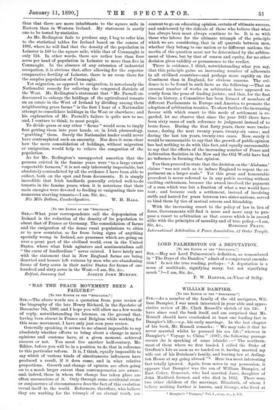THE DEPOPULATION OF IRELAND.
[To THE EDITOR OP THE " SPECTATOR."]
Sin,—By my statement that the population of the Eastern half of Ireland is " thicker " than that of the Western half, I did not imagine I could be supposed to mean anything else than that there are more inhabitants to the square mile in Eastern than in Western Ireland. My statement is gii.ffely one to be tested by statistics.
As Mr. Redington fails to produce any, I beg to refer him to the statistical tables for Ireland based on the census of 1881, where he will find that the density of the population in Leinster is 169 to the square mile, while that of Connaught is only 124. In other words, there are rather less than four acres per head of population in Leinster to more than five in Connaught. In the absence of any extension of industrial occupation, it is obvious that, after allowing for the superior comparative fertility of Leinster, there is no room there for the surplus population of Connaught.
Yet migration, as opposed to emigration, is notoriously the Nationalist remedy for relieving the congested districts of the West. Mr. Redington's statement that "Mr. Parnell en- deavoured to enlarge the holdings of the agricultural tenants on an estate in the West of Ireland by dividing among them neighbouring grass farms" is the first I hear of a Nationalist attempt to consolidate holdings in the West or elsewhere; and his explanation of Mr. Parnell's failure is quite new to me, and, I venture to think, to most people.
To divide grass or any other " farms " would seem to imply first getting them into your hands, or, in Irish phraseology, " grabbing" them. Surely the Nationalist leader could never have contemplated such an enormity. Nor does it seem clear how the mere consolidation of holdings, without migration or emigration, would help to relieve the congestion of the population.
As for Mr. Redington's unsupported assertion that the persons evicted in the famine years were "to a large extent respectable farmers," it is not only inherently improbable, but absolutely contradicted by all the evidence I have been able to collect, both on the spot and from documents. It is simply incredible that Irish landlords generally evicted well-to-do tenants in the famine years, when it is notorious that their main energies were devoted to feeding or emigrating their too numerous starving tenants.—I am, Sir, &c.,
Six Mile Bottom, Cambridgeshire. W. H. HALL.







































 Previous page
Previous page